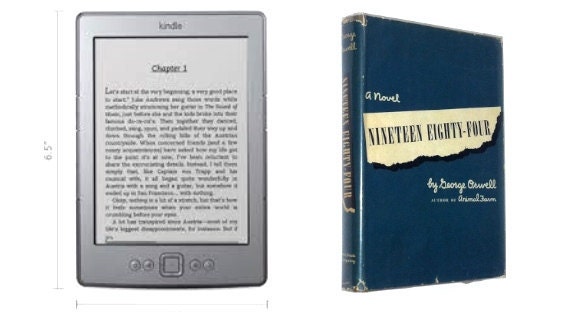Let me guess. You think that analog books made out of dead trees are better than futuristic digital books made out of electrons. Listen, I get the whole retro thing, I do. But would you seriously rather read your favorite book on medieval cave paper than on a landfill-grade plastic rectangle that spies on you and sells your data to marketing firms? Like how is that even debatable?
Pay attention. Here are eight reasons why ebooks are unironically the best:
1. They're not your books. They're content—content that you are licensed to use. You do not own them. So...
2. You can't give them as gifts.
3. You can't read them without trading away your privacy. E-book readers sell your reading habits to corporations, marketers, credit bureaus, and spammers. The government meanwhile takes an active interest in which books you choose to read. According to documents released by Edward Snowden, this information is considered to be the most reliable indicator of one's proclivity for social malfeasance. Plus If there's a microphone on the e-book reader it will record everything you say.
4. As a consequence, readers engage in self-censorship, avoiding controversial topics for fear of inviting suspicion. Online booksellers and libraries steer clear of these titles too--to appease the authorities, to evade accusations of complicity in crimes its users may commit, and to eliminate lawsuits and litigation that would ensue if any of their books were connected to anything unpleasant anywhere on earth. As a result, the ebook industry stocks and promotes bland and frivolous crap.
5. Because corporations involved in ebooks make only a small portion of their money from ebook purchases, e-bookstores are neither assembled nor organized in the interests of book readers. The ebook business is subservient to the business exigencies of data-mining, marketing, consumer electronics sales, and the like. Traditional industry incentives to provide quality and a large selection don't exist.
6. The ability to browse ceases to exist in the ebook world. The serendipity of finding an unexpected book isn't possible. 'Browsing' in the online world means being treated to a pathetic list of populist crap precisely computed to guarantee the e-book merchant the greatest profit. You're not going to be directed to interesting, esoteric, out-of-copyright books by intellectually honest, broad-minded friends. You're going to be put on the You-Might-Also-Like merry-go-round. It's not stimulating, not exciting, not smart, and not interesting. It's like taking a vacation to New York City and spending the whole trip bouncing between tourist traps. Unless you're already familiar with an offbeat or uncommon title there is virtually no chance whatever of your stumbling onto it in the sterile curated world of ebookstores. The intellectual breadth of the ebook-reading world is narrower than Oprah's Book Club. The theoretical expanse of books tricks people into believing they're trekking through a variegated universe of ideas when they're actually locked in a supply closet filled with garbage. But it's a safer, easier bet, economically speaking. And even the most contrived, unsubstantial semblance of adversarial opinion can be convincingly sold as variety to the masses if the market is dictated by the seller.
7. Having a personal book library has benefits not limited to reading. There are social aspects. People come over, look at your books, start conversations. Your bookshelves are an important expression of your personality and erudition. There is nothing at all like this in the e-book world. Do you think anybody cares that you downloaded 400,000 ebooks on Bit-Torrent that you will never read?
8. The illusion of unlimited data turns books into imaginary ephemera. The theoretical convenience of millions of books available any time any where creates the illusory conviction of intellectual engagement. Books that are just a click away are books that don't need to be read right now. Such immediacy engenders a bizarre form of procrastination. You've seen it: the people who boast about their ebook readers and ebook collections are the same people who have never ever read a book in their lives and never will. They don't have to.
